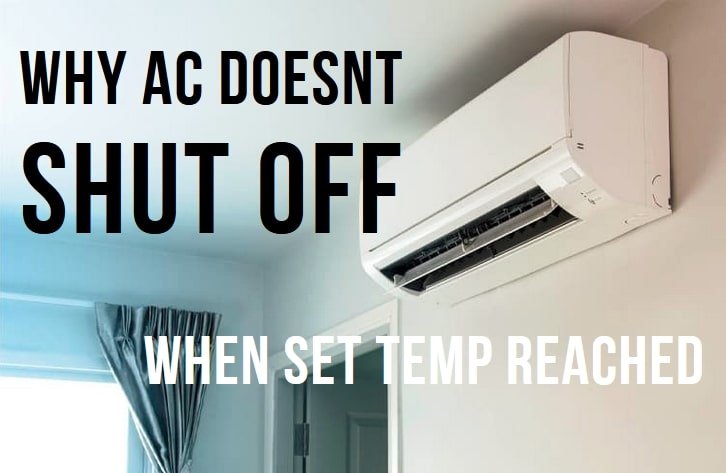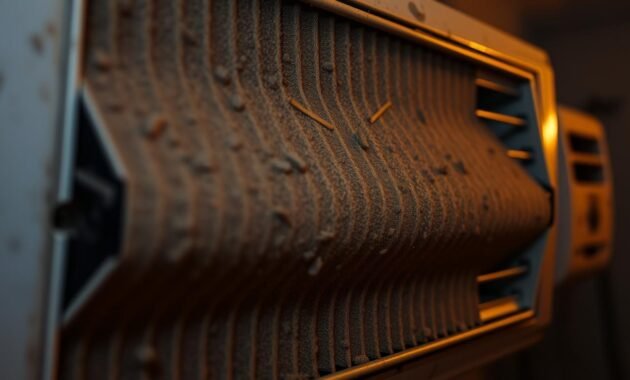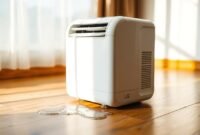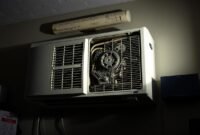Is your air conditioner always on, even after it hits the set temperature? This can mean big problems. It wastes energy and might harm your system.
Usually, air conditioners turn on and off a few times an hour. Each cycle is about 15-20 minutes. If yours won’t stop, it’s a sign of a serious issue.
I’ll help you figure out why your AC won’t turn off. And I’ll show you how to fix it so it cools your space right again.

Understanding Normal AC Operation Cycles
Air conditioning systems work in specific patterns to keep your home cool. Knowing these cycles helps spot problems with your cooling system.
Typical AC Running Times
A good air conditioning system runs in cycles of 15-20 minutes. These cycles help keep your home at the right temperature. When it works right, it:
- Cools your space to the right temperature
- Turns off when it reaches the set temperature
- Starts again when the room gets too warm
Signs of Abnormal AC Operation
Spotting a temperature sensor problem can stop long-term damage. Look out for these signs:
- Running all the time without cooling to the set temperature
- Cycles lasting over 30 minutes
- Starting and stopping too often
- Cooling unevenly in your home
Energy Efficiency Implications
Irregular AC operation affects energy use. Running longer than needed uses more electricity and can damage parts.
| Cycle Duration | Energy Efficiency Impact |
|---|---|
| 15-20 minutes | Optimal Performance |
| 30-60 minutes | Moderate Energy Waste |
| Constant Running | High Energy Inefficiency |
Keep an eye on your AC’s performance and fix issues fast. This helps keep your system efficient and saves energy.
Common Causes When AC Does Not Shut Off When Set Temp Reached

It’s frustrating when your AC won’t turn off after reaching the set temperature. This can be expensive and annoying. Several important problems might make your AC run non-stop, even after it’s cooled your space enough.
I’ve found out why your AC might keep running. This could mean you need to get your AC fixed. Knowing what causes this can help you find and fix the issue.
- Thermostat Malfunction: A broken thermostat can stop your AC from knowing when it’s cool enough
- Dirty Air Filters: Clogged filters block airflow, making your system work too hard and run longer
- Electrical Component Problems: Faulty relays or damaged switches can keep your AC running
- Low Refrigerant Levels: Not enough refrigerant stops your AC from cooling properly
- Undersized AC Unit: An AC that’s too small for your space can’t cool well
Each problem needs a different fix. Some can be solved with simple maintenance, while others need a pro. Knowing the exact cause is key to fixing it right and avoiding damage to your AC.
If your AC keeps running after it should stop, you need to check it fast. Running all the time uses more energy, wears out your AC faster, and raises your bills.
Thermostat Issues and Their Impact on AC Performance
Your air conditioning system works best when the thermostat is in good shape. A malfunctioning thermostat can mess up your home’s cooling and energy use. Let’s look at the common problems that might make your AC run all the time.
Thermostats usually need to be replaced every 10 years. Over time, several issues can stop your AC from turning off when it should.
Faulty Thermostat Sensors
A problem with the temperature sensors can really upset your cooling system. If sensors get dirty or damaged, they might not read the room temperature right. This makes the AC keep running because it thinks the room is too hot.
- Dust accumulation on sensors
- Physical sensor damage
- Incorrect sensor placement
Wrong Thermostat Settings
At times, the issue isn’t with the hardware but with how it’s set up. I suggest checking your thermostat’s settings to make sure they’re right.
- Verify cooling mode is selected
- Check target temperature settings
- Ensure fan settings aren’t set to “continuous”
Battery and Wiring Problems
Weak batteries or bad wiring can make your thermostat act strangely. Low batteries can mess up temperature readings. And, if the wiring is loose or corroded, it can stop the thermostat from talking to the AC unit.
Read also: How to Reset Clean Filter on LG Air Conditioner
Regular upkeep and expert checks can stop these problems. This ensures your AC works well and saves energy.
The Role of Dirty Air Filters in Continuous AC Operation

A dirty air filter can really hurt your AC’s performance. Dust and debris block the filter, limiting airflow. This makes your AC work too hard, leading to higher energy use and constant running.
Keeping your air filter clean is key for your AC to work well. Here are signs your filter needs cleaning:
- Reduced cooling efficiency
- Increased energy bills
- Weak airflow from vents
- Visible dust accumulation around air registers
A clogged filter also harms your indoor air quality. It puts extra stress on your AC parts, causing them to wear out faster.
| Filter Type | Recommended Replacement Frequency | Impact on AC Performance |
|---|---|---|
| Fiberglass | Every 30 days | High energy inefficiency |
| Pleated | Every 90 days | Moderate energy impact |
| HEPA | Every 6-12 months | Minimal energy inefficiency |
I suggest checking your filter every month and replacing it when needed. A clean filter boosts your AC’s efficiency. It also keeps your indoor air clean and prevents damage to your cooling system.
Electrical Component Problems and Solutions
Electrical issues in your AC system can cause it to run non-stop. Knowing these problems helps figure out why your AC won’t turn off.
Read also: Can I Turn on Heat to Defrost AC?
Electrical parts are key to your AC’s work. When they fail, it can mess up your cooling, making the fan run all the time or the compressor act strangely.
Stuck Relay Switches
Relay switches manage your AC’s electrical flow. If they get stuck, your system won’t turn off. Look out for:
- Constant humming from the AC unit
- Inability to stop cooling
- Unusual electrical clicking sounds
Compressor Contactor Issues
A bad compressor contactor can cause AC problems. It controls the power to the compressor. Damage can stop it from turning off right.
Fan Limit Switch Malfunctions
The fan limit switch controls the fan. If it fails, the fan keeps running. This uses more energy and can harm your system.
For electrical issues, always get a pro HVAC tech. They can fix it safely and right.
Impact of Dirty Condenser Coils on AC Performance
Dirty condenser coils can really hurt your air conditioning system’s performance. These parts are key in getting rid of heat from your home. But, when they get clogged with dust and dirt, they can’t do their job well.
This problem leads to big issues with ac energy inefficiency. Your AC system has to work way harder to cool your home. This means:
- More energy use
- Higher electricity bills
- Less cooling power
- System might overheat
I suggest keeping your condenser coils clean. They can get dirty fast, even outside. A pro HVAC tech can clean them well, making sure your system works right.
Cleaning your condenser coils is more than just fixing a problem. It’s a smart choice for your AC’s future. Regular care can make your system last longer, save you money, and keep your home cool.
Simple actions like yearly checks and keeping the area around your AC unit clean can really help. This boosts your air conditioner’s performance and saves energy.
Understanding Refrigerant Levels and System Operation
Refrigerant is key to your air conditioning system’s health. If refrigerant levels drop, your AC unit might need urgent repair. The cooling process relies on the right refrigerant pressure and flow.
Knowing how refrigerant affects your system is important. Low levels make it work harder, leading to continuous operation and damage over time.
Signs of Low Refrigerant
- Warm air blowing from vents
- Ice formation on outdoor unit
- Unusually long cooling cycles
- Increased energy bills
- Hissing or bubbling sounds near refrigerant lines
Professional Refrigerant Checks
Professional HVAC technicians use special tools to find and fix refrigerant problems. They can measure refrigerant levels, find leaks, and add more safely.
Trying to fix refrigerant issues yourself is risky and might be illegal. Certified technicians keep your system safe and follow environmental rules during repairs.
Getting regular checks from pros can save you money and keep your AC running well. Most makers suggest checking refrigerant levels yearly as part of maintenance.
DIY Troubleshooting Steps Before Calling a Professional
When your air conditioner isn’t working right, there are steps you can take before calling a pro. I’ll show you some DIY techniques that might save you money and time.
First, check your thermostat settings. Make sure it’s set to “cool” mode and the temperature is lower than the room’s. Sometimes, just changing the settings can fix the problem.
- Verify thermostat batteries are working
- Check electrical connections are secure
- Clean thermostat surface from dust
Then, look at your air filters. Dirty filters make your AC work too hard. Replace them if they’re clogged or haven’t been changed in months. This simple step can really help your system work better.
Next, check your outdoor unit for blockages. Remove leaves, grass clippings, and other debris that might block airflow. Make sure there’s at least two feet of space around the unit for it to work well.
| DIY Troubleshooting Step | Difficulty Level | Estimated Time |
|---|---|---|
| Thermostat Check | Easy | 10 minutes |
| Air Filter Replacement | Easy | 15 minutes |
| Outdoor Unit Cleaning | Medium | 30 minutes |
If these steps don’t fix your AC problem, it’s time to call a pro. If the issue keeps coming back, it might be something more serious like electrical or refrigerant problems. These need a professional to fix.
Conclusion
Dealing with an AC that won’t turn off when it reaches the set temperature can be really frustrating and expensive. I’ve learned that knowing how your air conditioning works is key to avoiding extra wear and wasting energy.
Regular maintenance of your air conditioner is not just a good idea—it’s essential. Getting your AC checked regularly, keeping filters clean, and having professionals inspect it can stop most problems. Simple actions like checking your thermostat, cleaning the condenser coils, and checking the refrigerant can save you a lot of money and prevent system failures.
While you can try to fix some issues yourself, complex AC problems need a pro. Certified HVAC technicians have the right tools and know-how to find and fix complex problems safely. If you’re not sure about your AC’s performance or have ongoing cooling issues, it’s best to call a professional.
Being proactive with your AC maintenance is your best defense against unexpected breakdowns. By staying informed and keeping an eye on your system, you can make sure it works well. This keeps your home cool and helps you avoid expensive repairs later on.


